IT service expectations are rising fast. According to a 2024 Gartner report, over 70% of enterprises now prioritize unified service experiences across IT, customer support, and operations.
At the same time, poor service management costs businesses an average of $4.5 million annually in downtime, lost productivity, and customer churn. In this environment, picking the right platform is not just a tech decision but a business-critical one. Two of the most widely adopted platforms leading this are Zendesk and ServiceNow.
Each serves a distinct purpose: Zendesk simplifies customer support and front-line engagement, while ServiceNow powers deep IT service management and complex enterprise workflows.
But which one fits your organization in 2025?
If you want to invest in a service platform that can grow with your business, this blog provides side-by-side comparisons, feature analysis, pricing clarity, and real-world use cases.
A Closer Look at Zendesk and ServiceNow: Understanding the Core Platforms
1. Zendesk

Source: Zendesk
Zendesk is a cloud-based customer service platform that streamlines support operations and enhances customer interactions. It offers tools that facilitate communication across various channels, ensuring a cohesive customer experience.
Essential Offerings of Zendesk:
- Omnichannel Support: Manage customer interactions across email, chat, phone, and social media from a unified interface.
- Ticketing System: Efficiently track, prioritize, and resolve customer inquiries with a centralized ticketing mechanism.
- Self-Service Options: Provide customers with knowledge bases and community forums to find answers independently.
- Automation and AI: Utilize automation tools and AI to handle repetitive tasks, allowing agents to focus on complex issues.
- Analytics and Reporting: Gain insights into support performance through customizable dashboards and reports.
- Integrations: Connect with various third-party applications to extend functionality and streamline workflows.
Zendesk is deal for businesses aiming to improve customer support efficiency, enhance customer satisfaction, and provide consistent service across multiple channels.
2. ServiceNow
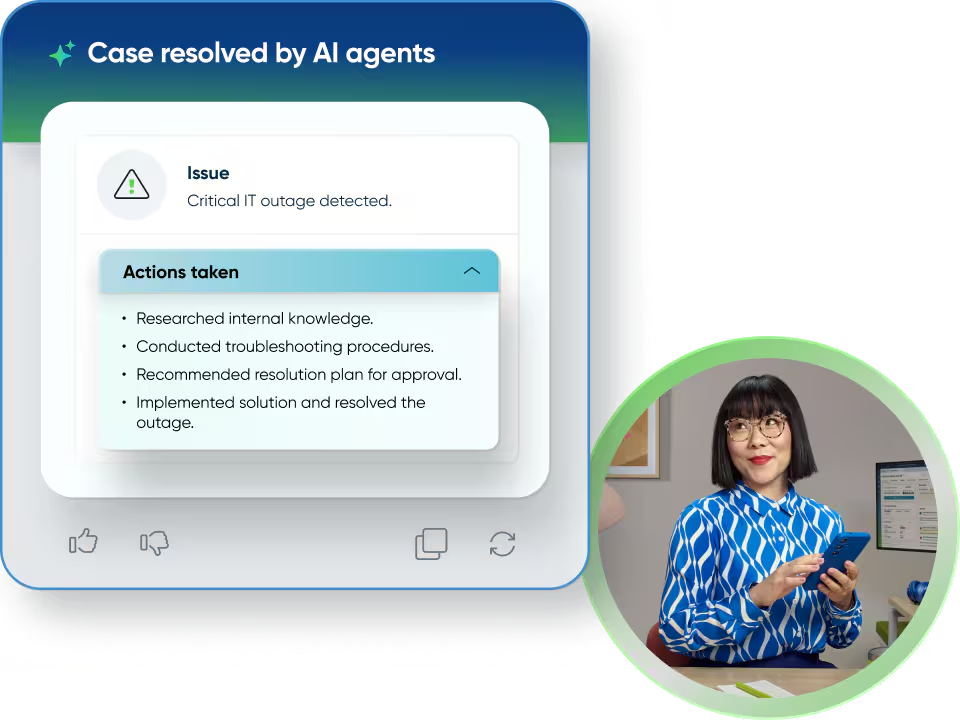
Source: ServiceNow
ServiceNow is a cloud-based platform that specializes in IT Service Management (ITSM) and automating enterprise workflows. It assists organizations in efficiently managing IT services, operations, and business processes.
Essential Offerings of ServiceNow:
- ITSM Modules: Comprehensive tools for incident, problem, change, and request management, aligning with ITIL standards.
- Workflow Automation: Automate routine tasks and processes across IT and business functions to increase efficiency.
- Configuration Management Database (CMDB): Maintain a centralized repository of IT assets and their relationships to ensure service continuity.
- Performance Analytics: Monitor and analyze service performance to make informed decisions and drive improvements.
- Integration Capabilities: Seamlessly connect with other enterprise systems to unify operations and data.
ServiceNow is suited for large organizations seeking to enhance IT service delivery, automate complex workflows, and integrate various business processes on a single platform.
Zendesk vs ServiceNow: A Practical Comparison of Features
Below is a detailed, side-by-side comparison of Zendesk and ServiceNow’s core features to help you evaluate which platform best fits your organization’s needs.
1. IT Service Management (ITSM)
Zendesk
Zendesk’s ITSM functionalities suit organizations with simpler IT support needs. While it provides essential features like ticketing and basic incident management, it lacks the depth and breadth of modules found in ServiceNow.
Zendesk focuses on delivering a user-friendly experience for handling IT support requests, but may not support complex ITIL-compliant processes.
ServiceNow
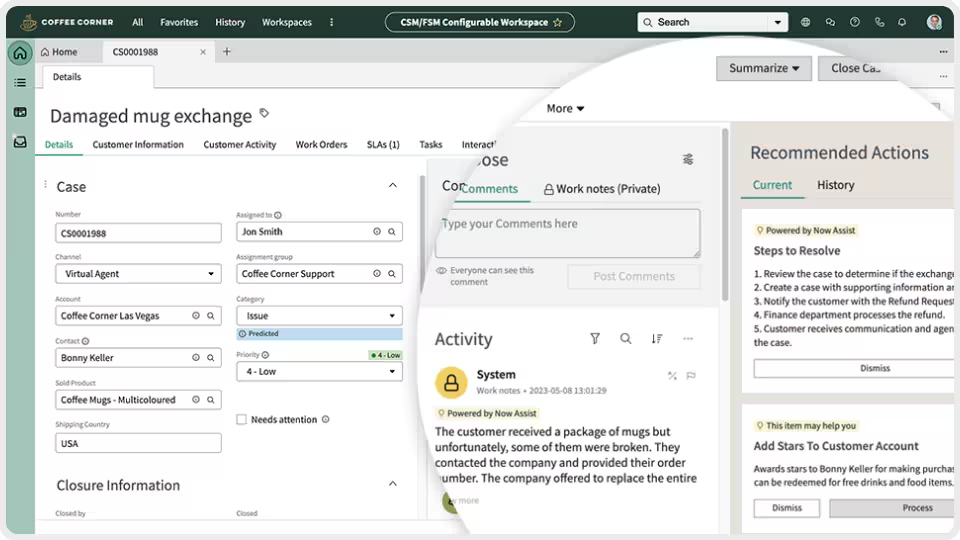
Source: ServiceNow ITSM
ServiceNow offers a comprehensive IT Service Management solution to manage and streamline IT services across large enterprises. Its platform includes incident, problem, change, and request management modules aligned with ITIL best practices.
The Configuration Management Database (CMDB) provides a centralized repository for IT assets, enabling better visibility and control over the IT environment. Additionally, ServiceNow’s IT Asset Management (ITAM) capabilities allow organizations to track and manage the lifecycle of hardware and software assets, ensuring compliance and optimizing resource utilization.
2. Customer Service Capabilities
Zendesk

Source: Zendesk
Zendesk excels in customer service by offering robust omnichannel support. Its platform allows businesses to manage customer interactions across email, chat, phone, and social media from a unified interface. Its features include live chat, AI-powered bots, and a comprehensive knowledge base, enhancing agent productivity and customer satisfaction. Integrating social messaging channels enables seamless communication with customers on their preferred platforms.
ServiceNow
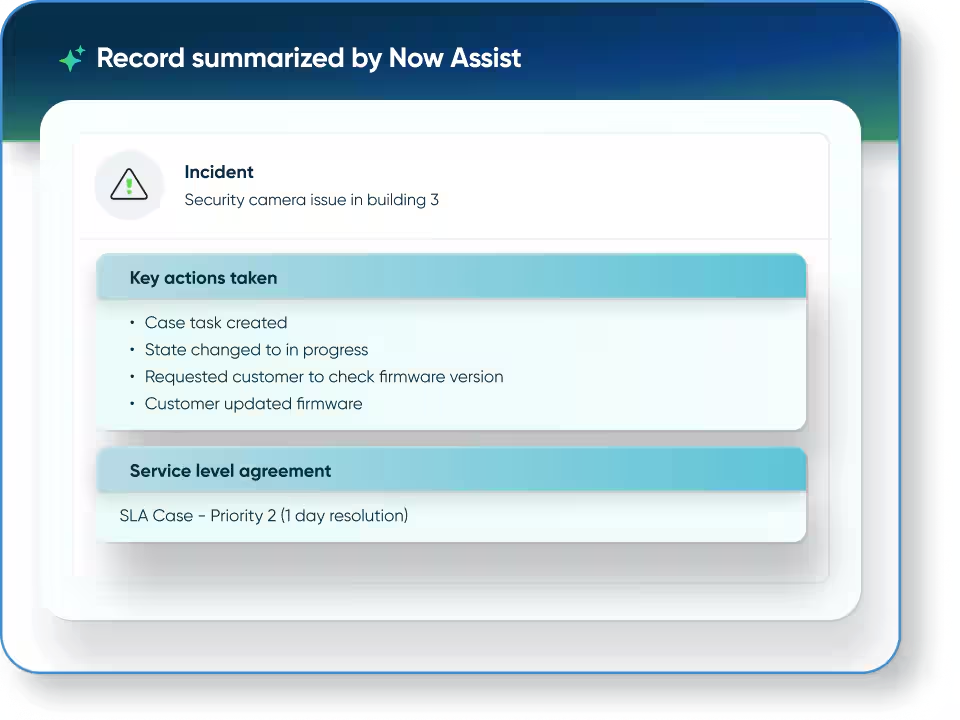
Source: ServiceNowCSM
ServiceNow’s Customer Service Management (CSM) module integrates customer service with backend IT operations, focusing on resolving customer issues through efficient workflows. While it may not offer the same level of omnichannel engagement as Zendesk, ServiceNow’s strength lies in connecting customer service with other departments, facilitating faster issue resolution, and improved service delivery.
3.User Interface and Experience
Zendesk
Zendesk provides a user-friendly interface designed for ease of use and quick deployment. Its clean and intuitive design allows support agents to navigate the system with minimal training, making it suitable for organizations seeking rapid implementation and adoption. The platform’s simplicity does not compromise functionality, balancing usability and feature richness.
ServiceNow
ServiceNow’s interface is more complex due to its extensive range of functionalities. While it offers powerful customization and integration capabilities, users may require more comprehensive training to utilize the platform effectively.
4. Integration and Customization
Zendesk
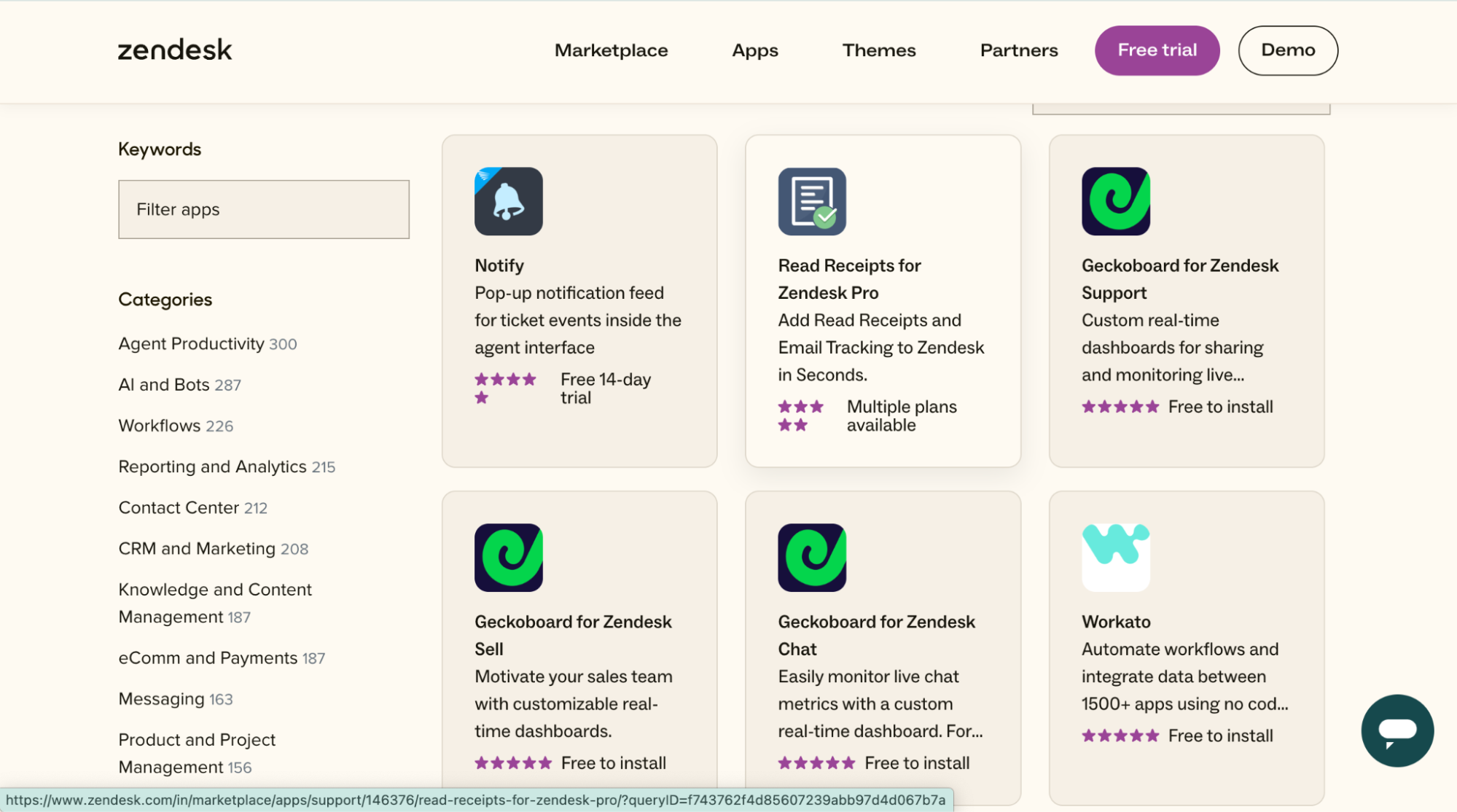
Source: Zendesk
Zendesk offers various integrations through its Marketplace, allowing businesses to connect with multiple third-party applications to enhance their support capabilities. While customization options are available, they may be limited compared to more complex platforms. Zendesk focuses on providing straightforward integration solutions catering to everyday business needs.
ServiceNow
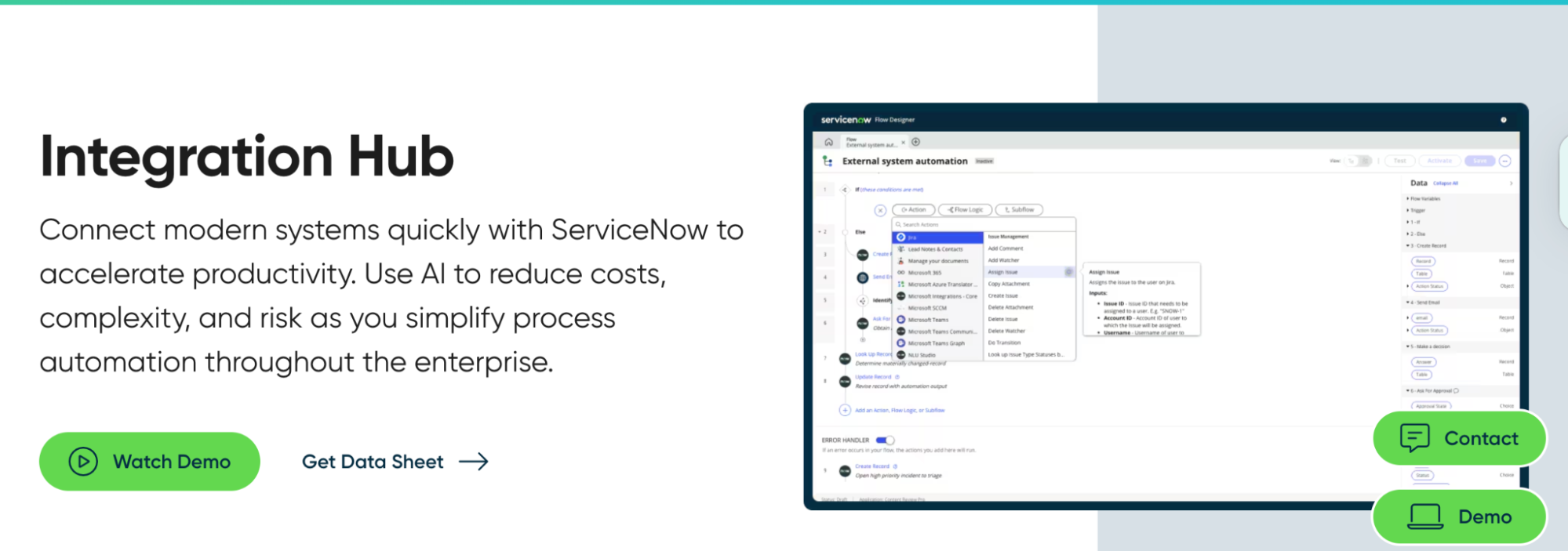
Source: ServiceNow
ServiceNow is highly customizable, supporting integration with various enterprise systems through its Integration Hub. This allows organizations to tailor workflows and processes to their specific requirements. The platform’s flexibility suits businesses with complex integration needs and those seeking to automate and optimize their IT and business processes extensively.
Ticket Management and Incident Handling
Zendesk
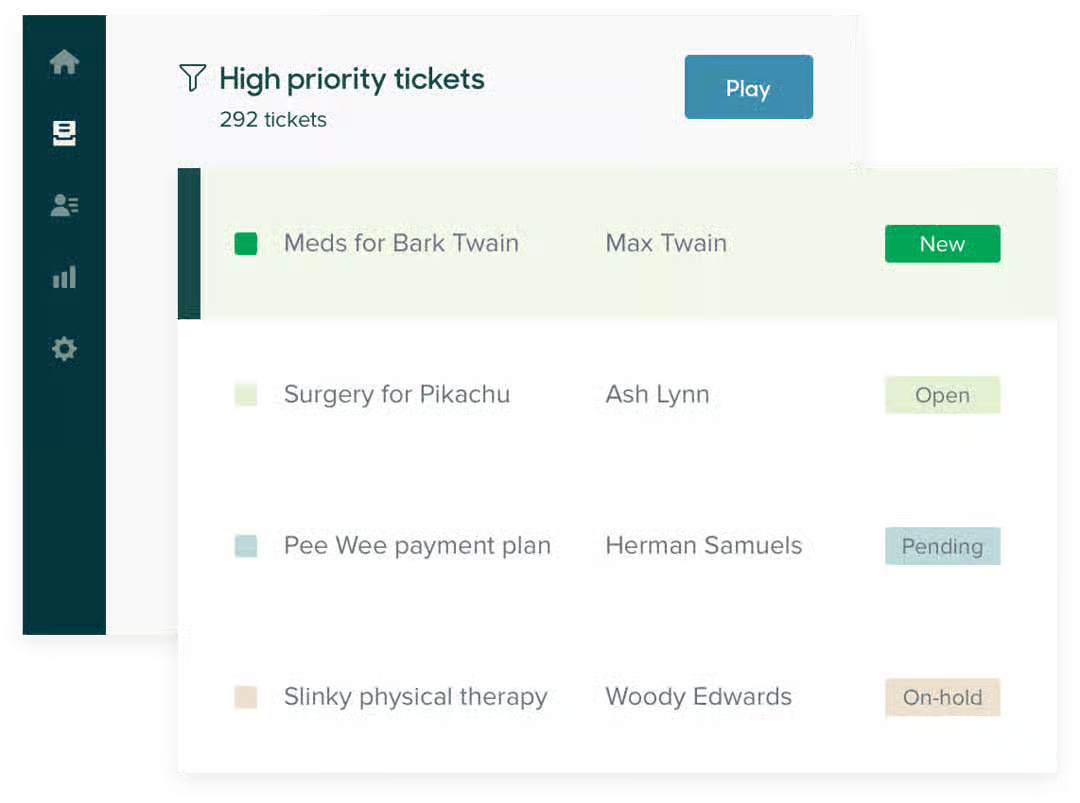
Source: Zendesk
Zendesk offers a streamlined ticketing system designed to provide efficient customer support. Its interface allows agents to manage inquiries from various email, chat, phone, and social media channels in a unified workspace.
The platform supports features like ticket prioritization, tagging, and automated responses, facilitating quick resolution of customer issues. Additionally, Zendesk provides tools for linking related tickets and tracking their status, enhancing visibility and coordination among support teams.
ServiceNow
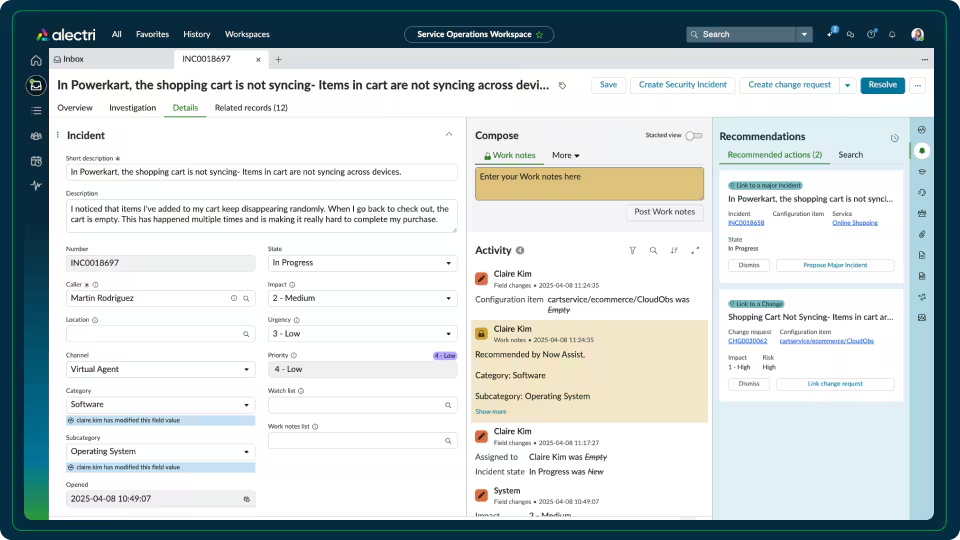
Source: ServiceNow
ServiceNow’s incident managementis part of its broader IT Service Management (ITSM) suite. It enables organizations to log, classify, and prioritize incidents, ensuring timely resolution.
The platform supports automated workflows that can escalate incidents based on predefined criteria, integrate with problem and change management processes, and provide comprehensive reporting. ServiceNow’s approach emphasizes restoring normal service operations swiftly while minimizing business impact.
6. Reporting, Analytics, and Insights
Zendesk

Source: Zendesk
Zendesk’s Explore feature provides reporting and analyticstools for customer support metrics. Users can access pre-built dashboards and create custom reports to monitor key performance indicators such as ticket volume, response times, and customer satisfaction scores. These insights help organizations assess support team performance and identify areas for improvement.
ServiceNow
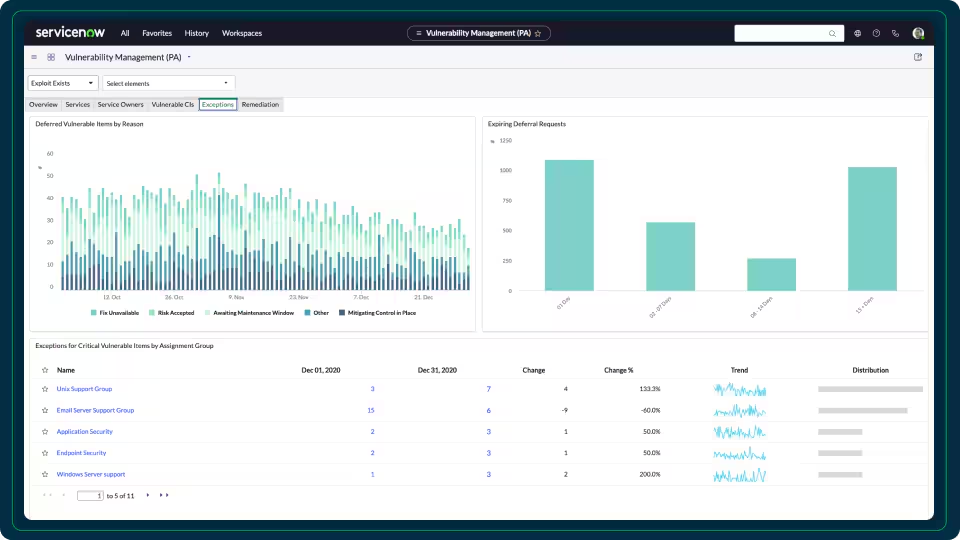
Source: ServiceNow
ServiceNow offers comprehensive analytics capabilities through its Performance Analytics module. This feature allows organizations to track and visualize data across various processes, including IT operations, HR, and customer service.
Users can create real-time dashboards, set targets, and analyze trends to drive informed decision-making and continuous improvement across the enterprise.
Zendesk vs ServiceNow Pricing: What You Need to Know
1. Zendesk
Zendesk offers a transparent and tiered pricing structure to accommodate businesses of various sizes and needs.
- Suite Team: Priced at $55 per agent per month (billed annually), this plan includes essential features such as a ticketing system, email, chat, voice, social messaging, a help center, AI agents, and prebuilt analytics dashboards.
- This plan strongly emphasizes per month (billed annually) and builds upon the Suite Team features by adding multiple ticket forms, service level agreements (SLAs), customer satisfaction ratings (CSAT), multilingual support, and an ice customer portal.
- Suite Professional: For $115 per agent per month (billed annually), this plan includes all features from the previous tiers and adds custom and live analytics, side conversations, skills-based routing, integrated community forums, and data location options.
- Suite Enterprise: Starting at $169 per agent per month (billed annually), this plan offers advanced customization options, including custom roles and permissions, and is designed for large enterprises with complex support needs.
Zendesk also provides a 14-day free trial for its Suite plans, allowing potential customers to explore the platform’s features before committing to a subscription.
2. ServiceNow
ServiceNow employs a customized pricing model tailored to each organization’s specific requirements. Unlike Zendesk, ServiceNow does not publicly list standard pricing tiers; instead, pricing is determined based on factors such as:
- License Type: Different roles (e.g., Admin Users, ITIL Users, Fulfiller Users) have varying access levels and associated costs.
- Number of Users: Pricing scales with the number of users and their respective roles within the organization.
- Selected Modules: Costs vary depending on the specific ServiceNow modules and applications chosen, such as IT Service Management (ITSM), Customer Service Management (CSM), or Human Resources Service Delivery (HRSD).
- Deployment Model: ServiceNow offers cloud-based and on-premises solutions, with pricing influenced by the chosen deployment method.
ServiceNow operates on a subscription-based model, with annual or multi-year agreements. The base package starts at approximately $100 per user per month, but this can increase significantly with additional modules, customizations, and implementation services.
Engaging with a ServiceNow sales representative can provide a customized quote based on your organization’s unique needs and usage patterns. At DKode Technologies, we deliver tailored ServiceNow solutions beyond standard implementation, focusing on automation, process optimization, and scalable service management.
Feature Comparison: Zendesk vs. ServiceNow
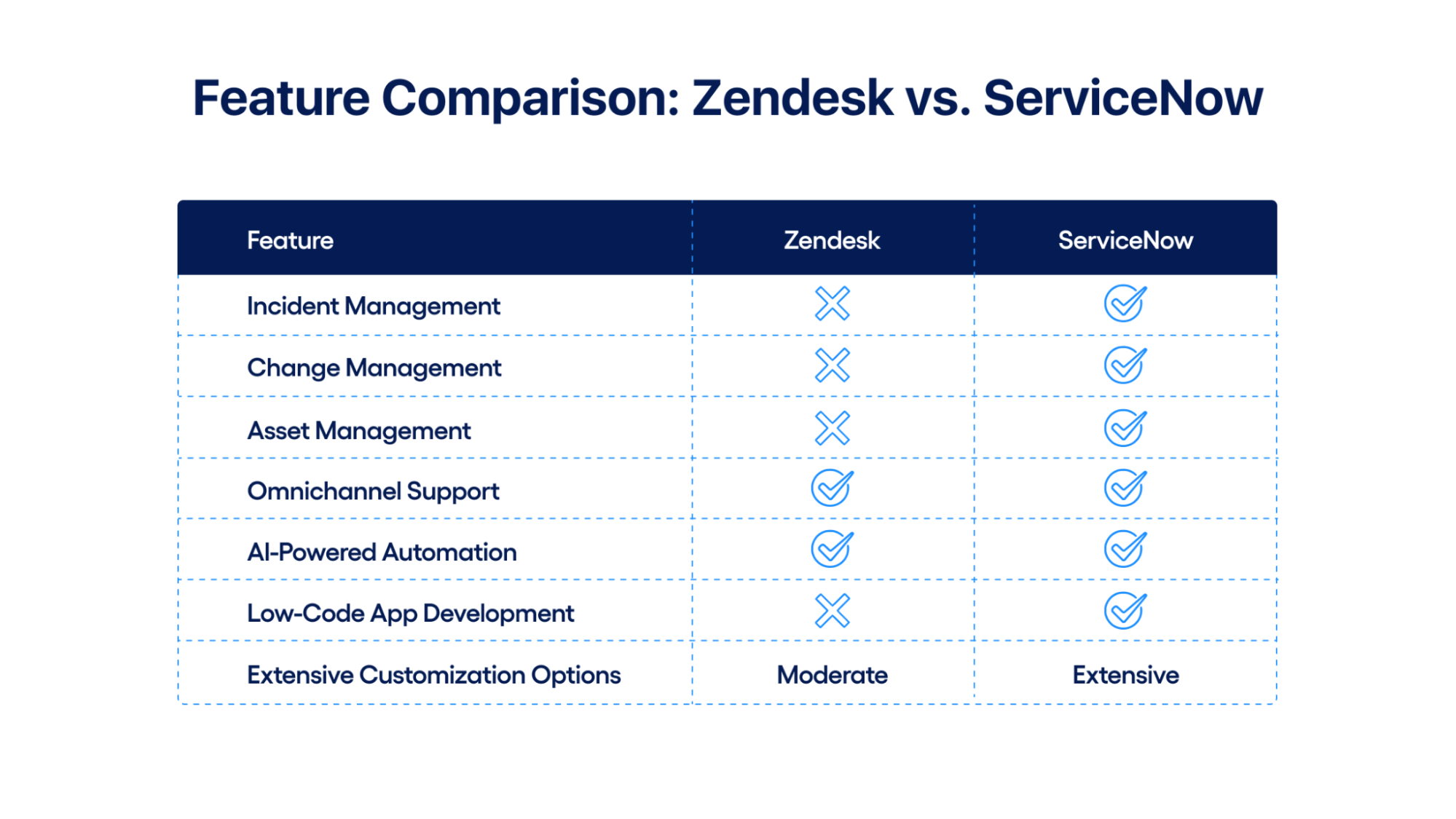
Zendesk or ServiceNow: How to Choose the Right Platform
Choosing between Zendesk and ServiceNow in 2025 depends on your organization’s specific needs, size, and objectives.
When to Choose Zendesk?
If your organization prioritizes customer experience and needs an easy-to-deploy and manage tool, Zendesk may be the ideal choice.
- You want ease of use. Zendesk’s intuitive interface makes it simple for your team to get started with minimal training.
- You support customers across multiple channels . Zendesk allows you to manage email, chat, phone, and social media conversations from one centralized dashboard.
- You plan to scale over time. Whether you’re a startup or a mid-sized company, Zendesk can grow with you.
- You rely on integrations. With a wide marketplace of third-party apps, you can extend Zendesk to fit your existing tech stack.
However, if your needs go beyond customer support into areas like IT service management or enterprise-level process automation, Zendesk might fall short.
When to Choose ServiceNow
ServiceNow is built for you if you’re operating at an enterprise level and need a platform that can handle complex service operations across departments.
- You need robust ITSM capabilities.ServiceNow includes incident, problem, change, and asset management—all aligned with ITIL best practices.
- You deal with multi-step workflows. Its powerful automation engine helps you manage workflows across IT, HR, finance, and other business units.
- You require deep customization.ServiceNow lets you tailor processes, roles, and modules to fit your business requirements.
- You work with a complex enterprise stack. ServiceNow integrates seamlessly with your broader ecosystem of enterprise tools.
Look closely at your team’s size, technical complexity, and long-term goals. The right platform is the one that best fits your business.
Why ServiceNow is the Right Choice for Your ITSM Needs?
The platform’s complexity may require dedicated resources for implementation and management, making it more suitable for larger organizations. Here is why ServiceNow is the perfect fit for your organization’s needs:
1. Comprehensive ITSM Across Diverse Use Cases
ServiceNow’s ITSM platform effectively addresses various scenarios, including B2B, B2C, and internal operations. For instance, a global financial institutionimplemented ServiceNow to enhance compliance, operations, and customer experience. By integrating AI and automation, they streamlined processes, improved regulatory compliance, and elevated customer satisfaction.
2. AI-Driven Automation Enhancing Efficiency
ServiceNow utilizes AI to automate routine tasks and accelerate issue resolution. A notable example is a multinational company that deployed AI-powered automation in ServiceNowto optimize its IT service desk operations. By automating ticket classification and incident routing, the organization saw a 50% reduction in resolution times.
3. Low-Code Development with App Engine Studio
ServiceNow’s App Engine Studio provides a low-code environment for rapid application development. A global retailer demonstrated this capability by using App Engine Studio to create custom applications, resulting in streamlined IT operations and enhanced efficiency.
4. Expansive Customization and Integration
ServiceNow offers extensive customization options, allowing businesses to tailor workflows and processes to their needs. A case in point is a global supplier of technology and servicesthat implemented a domain-separated ServiceNow ITSM to manage multiple clients’ data and IT service requests on a single platform, achieving smooth client onboarding and management.
5. Enhanced Security and Compliance
ServiceNow provides advanced compliance management tools and granular access controls, aiding organizations in meeting stringent regulatory demands. For example, a leading insurance company partnered with REDE Consulting Services to utilize ServiceNow GenAI, streamlining their processes, improving efficiency, and enhancing customer satisfaction, thereby addressing industry-specific compliance requirements.
Build a Scalable ITSM Framework Backed by ServiceNow Expertise
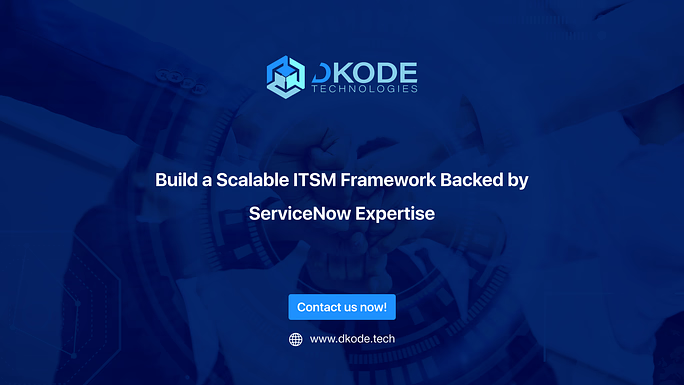
At DKode Technologies, we help organizations structure, scale, and streamline service delivery using the ServiceNow platform. But our work extends beyond support; we connect internal workflows with external demands to deliver measurable outcomes across teams.
Our certified ServiceNow professionals and ITIL Practitioners bring deep industry expertise and a proven ability to solve complex challenges. What sets us apart is our technical expertise and a strong, collaborative team culture built on trust, shared learning, and a commitment to excellence.
We support organizations across multiple service areas:
- Enterprise IT Solutions – End-to-end IT services including ITSM, ITAM, CMDB, and Security Operations tailored for enterprise efficiency and resilience.
- Software Development Solutions – Custom software solutions built to meet unique business needs with speed, flexibility, and scalability.
- Managed Support Services – Reliable, ongoing technical support to maintain system stability and ensure optimal performance
- Customer and Industry Solutions – Tailored ServiceNow CSM solutions to enhance customer experiences
- Asset Management – that offers complete visibility into hardware, software, and services—enabling accurate tracking, better control, and more efficient planning.
- IT Operations Management (ITOM) – to monitor systems, prevent disruptions, and ensure consistent performance across environments
By combining ITSM, CSM, and ITOM, we help businesses move faster, work smarter, and scale confidently, backed by a team as invested in your success.
Contact Us